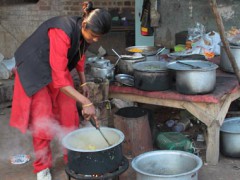-
Pakistan: Are Urban Women’s Growing Baking & Sewing Interests Problematic?
Written by Shaikh Rafia
Despite being terror-infested, Pakistan boasts a booming economy with thriving business, agricultural, and industrial sectors. The tax collection system in the country is in a shambles, with only 0.92% of the population paying taxes. While the way particular sectors should be properly taxed (or not) is hotly debated, this post […]
-

Flea markets drive economic growth in Ukraine
Written by Oleg Shynkarenko
On weekends I often wander around a local flea market in Kyiv. I rarely buy anything but I love examining all the stuff people decide to get rid of to earn a bit of cash. Last weekend I noticed one woman who apparently had brought her tableware to market! I picked […]
-

Catcalls and the right to the city
Written by Juliana Cunha
JULIANA CUNHA In Brazil, a campaign against catcalls is drawing attention to the situation of women in cities. Male catcallers are found in many places around the world and there’s no shortage of them either in any city in Brazil. It’s highly unlikely for a woman to spend a day […]
-
Poor and Female — a Double Curse in Pakistan
Written by Faisal Kapadia
It’s not like women in Pakistan have it easy, no matter what their financial status is or where they live. They are living in a society that is oppressive at best, misogynistic and downright cruel at its worst. This is why the World Economic Forum’s 2012 Gender Gap Report ranked […]
-

Delhi’s homeless women: the street, my shelter, my home
Written by Rahulkumar
The past couple of years women have been raising their voices in cities all across the world. And it all began in the Canadian city of Ontario, sparked by a Toronto police officer’s contemptuous comment that “women should avoid dressing like sluts” if they wanted to avoid harassment on the […]
-

The Global Implications of Geoengineering
Written by Samuel Chapman
~If the earth must lose that great portion of its pleasantness which it owes to things that the unlimited increase of wealth and population would extirpate from it, for the mere purpose of enabling it to support a larger, but not a better or a happier population, I sincerely hope, […]
